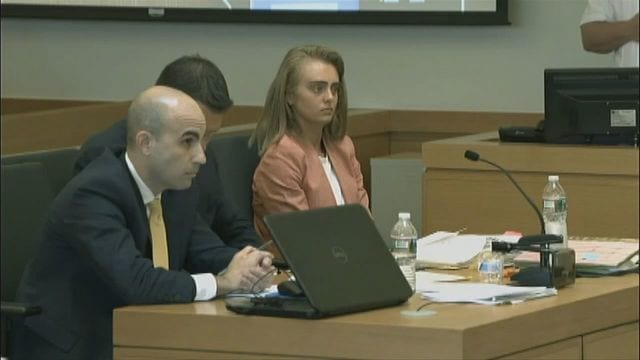Michelle Carter, a young woman whose text messages urged her boyfriend to carry through with a suicide plan he’d began to reconsider, was convicted of involuntary manslaughter.
The verdict was announced Friday, drawing a close to a highly publicized case that began with the discovery of Roy Conrad III’s body in July 2014.
Carter, now 20, broke out in tears after the judge delivered his ruling.
The judge found that Carter was responsible for the death of Conrad Roy, who used exhaust emissions from a pickup truck to asphyxiate himself. The two dated as teenagers before Roy took his own life when the pair were 17 and 18, respectively.
The ruling is bound to attract some controversy, with the judge permitting Carter to remain free on bail until a sentence can be determined.
In the meantime, Carter is barred from making any contact with the victim’s family and isn’t allowed to leave the state of Massachusetts.
The sentence for involuntary manslaughter could see Carter facing consequences ranging in severity from a lengthy probation to 20 years in prison.
Carter was 17 years old when she sent a barrage of text messages to Conrad Roy, demanding that he follow through on a plan to commit suicide.
The young man had begun doubting his resolve and rationale, telling Carter he was having second thoughts.

“I thought you wanted to do this. The time is right and you’re ready, you just need to do it!” Carter wrote in one text message.
Prosecutors also revealed that, as Roy began to fill his truck with exhaust emissions containing carbon monoxide, he got scared and stepped out.
A message from Carter ordered him to “Get back in,” according to a mutual friend who said the perpetrator described the last conversation between the couple to her about a month after Roy was found dead in the parking lot of a store in Fairhaven, MA.
Carter’s lawyers argued that Roy had a lengthy history of depression and failed suicide attempts, and that his long-time girlfriend had initially tried to talk him out of taking his own life. After some time, they claim, Carter assented and began providing her support.
A psychiatrist who testified for the defense speculated that one of the antidepressant medications Carter had been taking, Celexa, could have contributed to the behavior many have derided as callous and practically antisocial.
Celexa, said Dr. Peter Breggin, can impact the brain’s frontal lobe, which, among other functions, contributes to humans’ ability to feel empathy and gauge the long-term consequences of decisions.
According to Breggin, Celexa brought Carter into a ‘grandiose’ delusional state, causing her to believe that she could help Roy ascend to heaven while she cared for his family.
However, prosecutors chose to focus on some of the text messages Carter had sent Roy in the days before he was found asphyxiated in a store parking lot.
“You can’t think about it. You just have to do it. You said you were gonna do it. Like I don’t get why you aren’t,” Carter wrote to Roy the same day he committed suicide.
The case has the potential to set a precedent on the legal consequences of encouraging another person to commit suicide.
Sources
Michelle Carter is Guilty of Manslaughter in Texting Suicide Case
Woman who sent texts urging boyfriend’s suicide found guilty of manslaughter


Join the conversation!